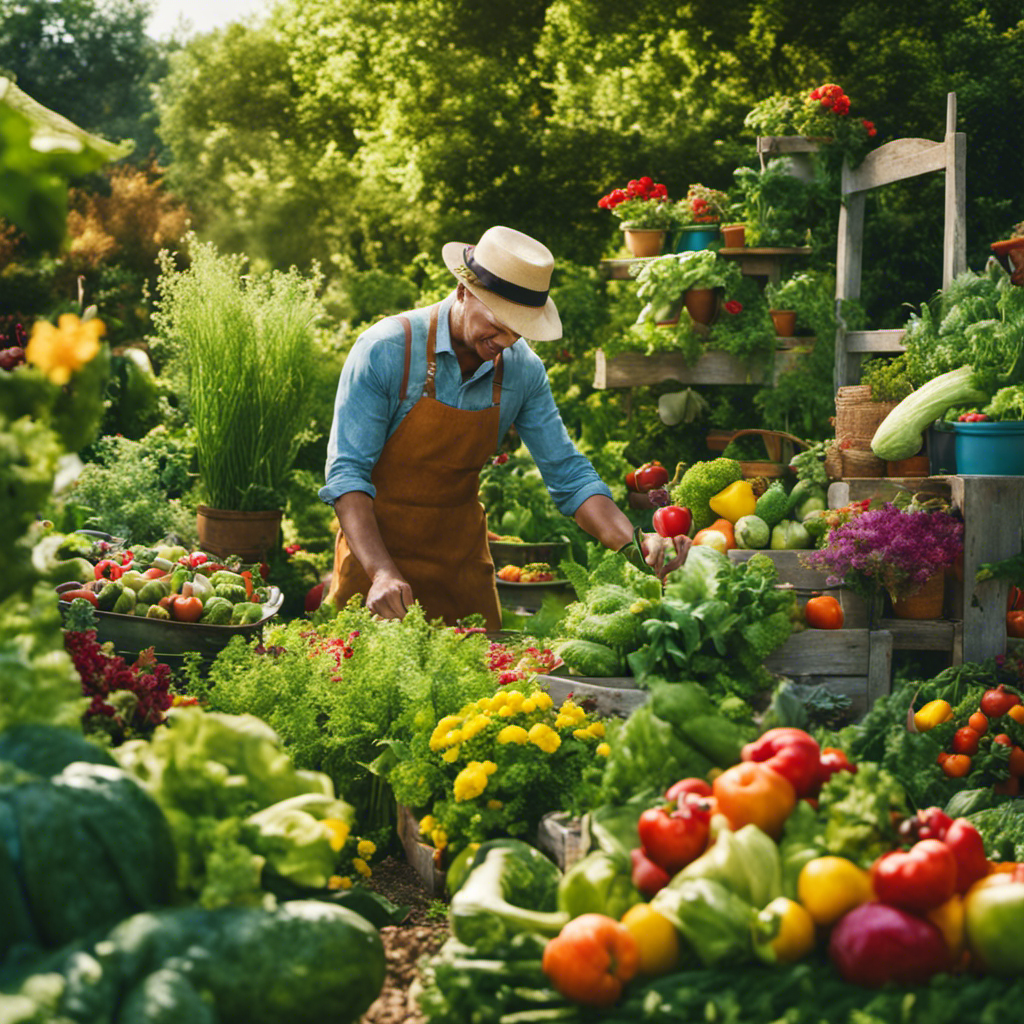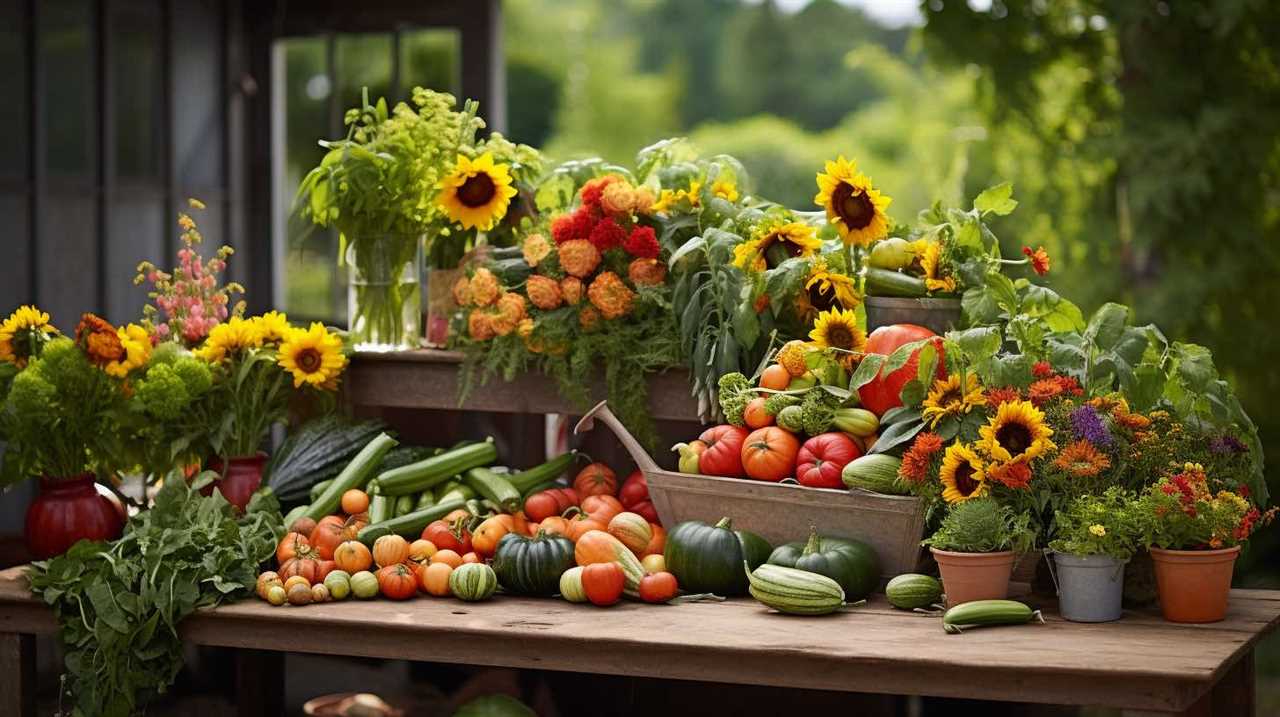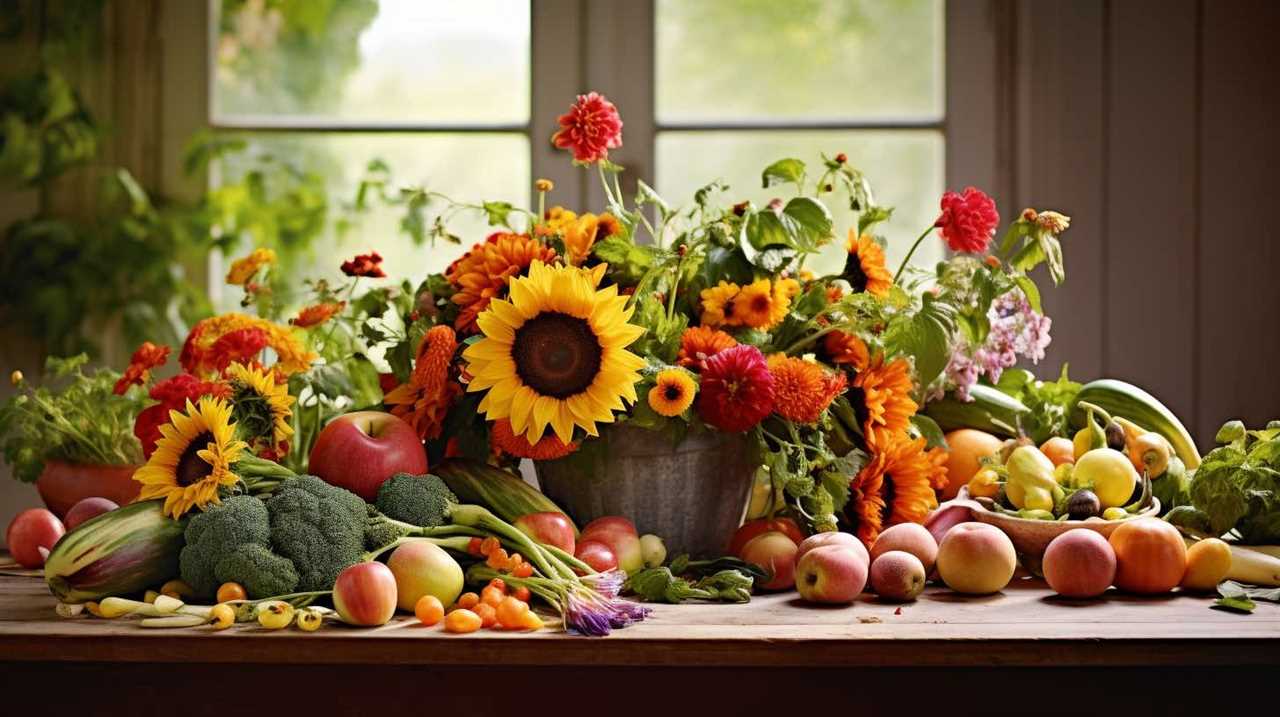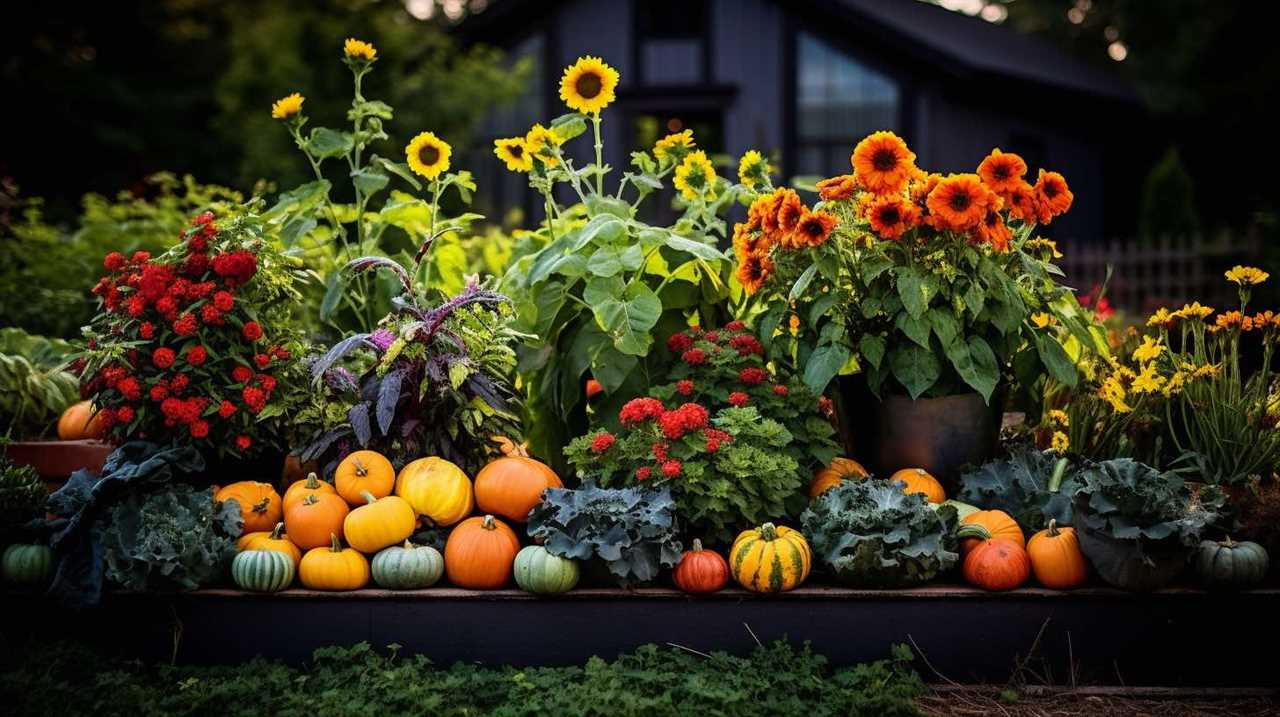Homesteading and Self-Sufficiency
8 Incredible Benefits of Growing Your Own Food

The saying, “You are what you eat,” is well-known to many of us. Imagine if we told you that growing your own food empowers you to precisely choose what you consume?
It’s true! In this article, we’ll explore the incredible benefits of growing your own food. From healthier and more nutritious meals to cost savings and greater food security, you’ll discover how cultivating your own garden can positively impact your health, wallet, and the environment.
Key Takeaways
- Growing your own food promotes healthier produce by allowing control over the use of pesticides and chemicals.
- Cultivating your own fruits and vegetables ensures access to fresh, nutrient-rich options year-round, promoting self-sufficiency and better dietary choices.
- Growing your own food reduces grocery expenses, eliminates the need for transportation to the store, and saves money on packaging costs.
- Implementing sustainable practices like composting and rainwater harvesting contributes to environmental sustainability while growing your own food.
Healthier and Nutritious Food
We’ve been making an effort to eat healthier and more nutritious food since last year. One of the most effective ways we’ve found to achieve an improved diet is by growing our own food.
As we cultivate our own fruits and vegetables, we’ve full control over what goes into the soil and onto our plates. This allows us to eliminate the use of harmful pesticides and chemicals, resulting in healthier produce.
Furthermore, growing our own food promotes self-sufficiency, as we’re no longer dependent on supermarkets for our daily sustenance. By taking charge of our own food production, we’re able to ensure that we’ve access to fresh, nutrient-rich options year-round. This self-sufficiency not only enhances our physical health but also empowers us to make better dietary choices.
Now, let’s explore another incredible benefit of growing our own food – cost savings.
Cost Savings
Since we started growing our own food, we’ve noticed significant cost savings in our grocery bills. Not only is growing our own food a rewarding and fulfilling experience, but it also helps us save money in several ways:
-
Reduced grocery expenses: By growing our own fruits, vegetables, and herbs, we significantly cut down on the amount of produce we need to purchase from the store.
-
Lower transportation costs: With our own garden, we no longer need to drive to the store every time we need fresh produce, saving us money on transportation.
-
Elimination of packaging costs: Growing our own food means we can harvest it directly from the garden, eliminating the need for expensive and wasteful packaging.
-
Long-term savings: Investing in DIY gardening techniques, such as composting and rainwater harvesting, helps us save money on fertilizers and water bills in the long run.
Environmental Sustainability
Implementing sustainable practices in our gardening, such as using organic fertilizers and conserving water, allows us to contribute to environmental sustainability while growing our own food.
By reducing waste and conserving resources, we can make a positive impact on the environment. One way to reduce waste is through composting. Composting food scraps and yard waste not only reduces the amount of waste sent to landfills but also creates nutrient-rich soil for our gardens.
Additionally, conserving water is crucial for environmental sustainability. Collecting rainwater in barrels and using it to water our plants is a great way to conserve this precious resource. We can also install drip irrigation systems to minimize water usage.
Greater Food Security
By growing our own food and diversifying our crops, we can ensure greater food security for our community. Food sovereignty and self-sufficiency are essential for a resilient and sustainable future.
Here are some key benefits of cultivating our own food:
-
Increased access to fresh and nutritious produce: Growing our own food allows us to have a constant supply of fresh fruits, vegetables, and herbs, ensuring a balanced and healthy diet.
-
Reduced reliance on external food sources: By producing our own food, we become less dependent on external suppliers, mitigating the risk of food shortages or disruptions in the supply chain.
-
Promotion of biodiversity: Diversifying our crops helps maintain a variety of plants, enhancing ecosystem resilience and protecting against crop diseases or pests.
-
Community building and empowerment: Engaging in food production fosters a sense of community and self-reliance, as individuals come together to share knowledge, resources, and surplus harvests.
Enhanced Flavor and Freshness
We can enjoy the enhanced flavor and freshness of our homegrown produce, and it’s truly satisfying. When we grow our own food, we’ve control over the entire process, from choosing the seeds to harvesting the fruits and vegetables. By implementing various gardening techniques, such as companion planting, crop rotation, and organic fertilizers, we can ensure that our plants receive the optimal conditions for growth. This results in produce that’s bursting with flavor and nutrients.
Additionally, growing our own food allows us to enjoy seasonal harvests. We can savor the taste of freshly picked tomatoes in the summer or indulge in the sweetness of homegrown strawberries in the spring. The satisfaction of eating food that we’ve nurtured from seed to plate is immeasurable. Not only does it promote physical and mental well-being, but it also connects us to nature and the joy of self-sufficiency.
Physical and Mental Well-being
The article highlights the incredible benefits of growing our own food, emphasizing how it promotes physical and mental well-being. Here are some reasons why:
-
Improved Immunity: Growing our own food allows us to have access to fresh, nutrient-rich produce. By consuming these fruits and vegetables, we can boost our immune system and improve our overall health. Studies have shown that homegrown vegetables contain higher levels of vitamins, minerals, and antioxidants compared to store-bought produce.
-
Stress Reduction: Gardening has been proven to be a great stress reliever. Engaging in activities like planting, watering, and harvesting can help reduce anxiety and promote relaxation. The act of being in nature and connecting with the earth can have a calming effect on our minds and bodies.
-
Physical Activity: Growing our own food requires physical effort, such as digging, weeding, and lifting. This allows us to engage in regular exercise, which is essential for maintaining a healthy lifestyle. Gardening can be a fun and enjoyable way to stay active.
-
Mental Well-being: Gardening has been linked to improved mental health and well-being. It provides a sense of satisfaction and accomplishment when we see the fruits of our labor. The act of nurturing plants and watching them grow can also boost our mood and increase feelings of happiness.
Educational and Skill-building Opportunities
Additionally, exploring educational and skill-building opportunities through gardening can greatly enhance our knowledge and abilities.
Gardening provides a unique platform for skill development and lifelong learning. From understanding the science behind plant growth to learning about different soil types and the role of insects in pollination, gardening offers a multitude of educational opportunities.
It allows us to develop practical skills such as planting, watering, and harvesting, while also fostering a deeper appreciation for nature and the environment. Furthermore, gardening can teach us important life skills such as patience, perseverance, and responsibility.
Research has shown that engaging in gardening activities can improve cognitive function, enhance problem-solving abilities, and promote creativity. It also provides a hands-on learning experience that encourages continuous learning and personal growth.
Community Engagement and Social Connection
Engaging in community events and activities fosters meaningful relationships and a sense of belonging.
One way to promote community engagement and social connection is through the establishment of community gardens. These gardens serve as gathering places where individuals come together to grow their own food, share knowledge, and develop a sense of camaraderie.
Urban farming initiatives also play a crucial role in fostering community engagement. By transforming unused urban spaces into productive gardens, these initiatives not only provide fresh produce to the community but also create opportunities for people to come together, work collaboratively, and strengthen their social ties.
Additionally, community gardens and urban farming initiatives often organize events such as workshops, volunteer days, and harvest festivals, further promoting social interaction and community bonding.
Frequently Asked Questions
Can Growing Your Own Food Help Reduce Stress and Improve Mental Well-Being?
Growing your own food can definitely help reduce stress and improve mental well-being. Gardening has been proven to be a therapeutic activity that promotes relaxation and mindfulness, leading to a more positive and balanced state of mind.
How Can Growing Your Own Food Contribute to Environmental Sustainability?
Growing our own food contributes to environmental sustainability by reducing waste through composting and minimizing packaging. Additionally, it increases biodiversity by promoting the use of organic practices and creating habitats for beneficial insects and wildlife.
Are There Any Educational Resources or Workshops Available for Beginners Interested in Starting Their Own Garden?
Educational resources and gardening workshops are available for beginners interested in starting their own garden. They provide valuable knowledge and hands-on experience, helping us develop essential skills and cultivate a deeper connection with nature.
Can Growing Your Own Food Help Improve the Overall Health and Immunity of Your Family?
Growing our own food has incredible benefits for our family’s overall health and immunity. It provides improved nutrition and allows us to become more self-sufficient. Research shows that homegrown produce is fresher, richer in nutrients, and free from harmful chemicals.
What Are Some Creative Ways to Engage With the Community and Promote Social Connection Through Growing Your Own Food?
Engaging with the community and promoting social connection through growing your own food can be done in various creative ways. By hosting community gardening events or starting a neighborhood produce exchange, we can foster connections and strengthen our sense of community.
Conclusion
In conclusion, growing your own food isn’t just about saving money or eating healthier. It’s about nurturing a connection with nature and reaping the rewards of your labor.
Like tending to a garden, cultivating our own food teaches us patience, resilience, and the importance of taking care of ourselves and our environment. It’s a metaphor for life, reminding us that with time, effort, and love, we can create something beautiful and sustainable.
So go ahead, grab a shovel and start growing your own food.
Homesteading and Self-Sufficiency
Unleashing the Rustic Charm: The ABCs of Farmhouse Living


Get ready to immerse yourself in the enchanting world of countryside living! Embark on a journey with us where simplicity reigns supreme and the joys of pastoral life are boundless.
From savoring farm-to-table delights to embracing the artistry of handcrafted treasures, our guide will show you how to infuse rustic charm into every aspect of your life.
So kick back, relax, and prepare to be captivated by the allure of authentic farmhouse living. Let’s unleash the rustic charm together!

Key Takeaways
- Farmhouse living promotes a slower pace of life and values simplicity and minimalism.
- Embracing sustainable practices, such as farm-to-table living and composting, is an important aspect of farmhouse living.
- Connecting with nature through outdoor activities and creating a serene outdoor space is a key component of farmhouse living.
- Handcrafted artistry and heritage preservation play a vital role in farmhouse living, honoring the past and shaping the future.
Embracing Simple Pleasures
We often find ourselves embracing simple pleasures, such as enjoying a cup of hot tea on a rainy afternoon. There’s something satisfying about the warmth of the mug in our hands and the aroma that wafts through the air. In our fast-paced lives, it’s essential to take a moment to appreciate these small but delightful experiences.
Embracing nature is another simple pleasure that brings us joy. Whether it’s taking a leisurely walk in the park, feeling the grass beneath our feet, or simply sitting outside and listening to the birds chirping, connecting with the natural world rejuvenates our minds and souls.
These simple pleasures remind us to slow down, appreciate the present moment, and find contentment in the beauty that surrounds us.
Farm-to-Table Delights
Let’s savor the farm-to-table delights, like fresh vegetables and locally sourced meats, that nourish both our bodies and our souls. At farm to table restaurants, we can experience the true essence of organic farming techniques, where every dish tells a story of passion and sustainability.

Here are some of the delectable treats we can indulge in:
- Crisp, vibrant salads bursting with farm-fresh greens and heirloom tomatoes.
- Tender, juicy steaks and chicken, raised with love on nearby pastures.
- Handcrafted cheeses and artisanal breads, made with locally harvested ingredients.
- Decadent desserts that showcase the natural sweetness of seasonal fruits.
Each bite takes us on a journey, connecting us with nature and the dedicated farmers who tend to the land. By supporting farm-to-table establishments, we not only savor the flavors, but also contribute to a more sustainable and vibrant food system.
Now, let’s step outside and explore the wonders of outdoor living.
Outdoor Living and Exploration
Let’s step outside and embrace the beauty of the great outdoors!

Nature-inspired outdoor decor allows us to create a serene and inviting space where we can relax and unwind.
Whether it’s exploring the wonders of our own backyard or venturing out into the wilderness, outdoor living and exploration offer endless possibilities for adventure and unforgettable memories.
Nature-Inspired Outdoor Decor
Have you ever considered incorporating nature-inspired outdoor decor into your own backyard oasis? It’s a fantastic way to bring the beauty of the outdoors into your everyday life. Here are some ideas to get you started:
-
Rustic wooden furniture: Add charm and character to your outdoor space with furniture made from reclaimed wood. Think benches, tables, and chairs that showcase the natural grain and imperfections of the wood.

-
DIY nature-inspired crafts: Get creative and make your own decor using materials found in nature. From driftwood wall hangings to leaf-printed pillows, the possibilities are endless.
-
Living walls: Create a stunning focal point by covering a wall with lush greenery. Vertical gardens not only add a touch of nature to your space but also provide privacy and insulation.
-
Water features: Incorporating a water element, such as a small pond or a fountain, can create a serene and tranquil atmosphere in your backyard. The sound of running water adds a soothing touch and attracts birds and wildlife.
With these nature-inspired decor ideas, you can transform your backyard into a peaceful sanctuary that reflects your love for the great outdoors.

Adventure in Your Backyard
We can embark on an adventure in our backyard by exploring new outdoor living opportunities. One exciting option is backyard camping. Set up a tent, roll out sleeping bags, and sleep under the stars. Imagine the thrill of falling asleep to the sounds of nature and waking up to the soft light of dawn.
As we venture into our own backyard, we can also discover a whole new world of wildlife. From birds chirping in the trees to squirrels scampering across the lawn, there’s so much to observe and appreciate. So grab your binoculars and explore the wonders of nature right in your own backyard.
As we gather around the cozy campfire, we can continue our outdoor adventure by enjoying the warmth and camaraderie that comes with cozy campfire gatherings.
Cozy Campfire Gatherings
As we huddle around the crackling flames, we can savor the warmth and storytelling that comes with cozy campfire gatherings. There’s something magical about the flickering glow that brings people together, creating an intimate atmosphere where memories are made.

Here are some cozy campfire activities to make your outdoor experience unforgettable:
- Roasting marshmallows and making s’mores, the quintessential campfire treat.
- Singing campfire songs, harmonizing with friends and family under the starry night sky.
- Sharing ghost stories that send shivers down your spine, embracing the thrill of the unknown.
- Playing games like charades or truth or dare, laughter mingling with the crackle of the fire.
Campfire cooking is another delightful aspect of these gatherings, where delicious meals are prepared over open flames. From grilled sausages to foil-wrapped potatoes, the smoky flavors infuse the food with a unique taste that can’t be replicated.
As the embers die down and we bid farewell to the campfire, let’s transition to another topic that brings us closer to nature: the joy of gardening.
Green Thumbs: The Joy of Gardening
Are you ready to get your hands dirty? Gardening isn’t just a hobby, it’s a way of life that brings immense joy and satisfaction.

Whether you have a spacious backyard or a small balcony, the benefits of gardening are countless. From growing your own fresh vegetables to creating a serene oasis of flowers and plants, gardening allows us to connect with nature and find solace in its beauty.
In this discussion, we’ll explore the popular garden plants, share gardening tips and tricks, and discover the many reasons why having a green thumb is truly a source of happiness.
Benefits of Gardening
Our lives have been enriched by the countless benefits of gardening, from the satisfaction of watching our plants grow to the nourishment we receive from harvesting our own fresh produce. Gardening not only provides us with a sense of accomplishment but also offers numerous advantages for our physical and mental well-being.
Here are some of the benefits we can enjoy through this therapeutic activity:

-
Stress relief: Spending time in the garden helps us unwind and reduce stress levels. The soothing sounds of nature, the scent of blooming flowers, and the gentle touch of soil on our hands create a calming environment that allows us to escape from the pressures of daily life.
-
Physical exercise: Gardening is a great way to stay active and burn calories. From digging and weeding to watering and planting, every task requires movement and contributes to a healthier body.
-
Mental stimulation: Engaging in garden activities stimulates our senses and keeps our minds sharp. Planning and designing the garden, identifying different plant species, and problem-solving when faced with challenges all contribute to mental agility.
-
Connection with nature: Gardening provides us with an opportunity to connect with the natural world. By nurturing and caring for plants, we develop a deeper appreciation for the environment and a sense of responsibility towards sustainable living.

As we delve into the world of gardening, we not only reap the benefits of fresh produce and a beautiful outdoor space but also find solace and fulfillment in garden therapy. It’s a powerful tool that allows us to nurture our bodies and minds while fostering a more sustainable way of living.
Popular Garden Plants
We love incorporating both sunflowers and lavender into our garden, as they add a vibrant splash of color and a soothing aroma to our outdoor oasis.
Gardening has numerous benefits, from improving mental health to providing fresh produce. When it comes to popular garden plants, sunflowers and lavender definitely top the list.
Sunflowers not only bring joy with their bright yellow petals, but they also attract beneficial insects like bees and butterflies.

Lavender, on the other hand, is known for its calming properties and can be used in various ways, from making homemade sachets to infusing oil for relaxation.
As for gardening tips and tricks, it’s important to choose the right location for your plants, provide adequate sunlight and water, and regularly prune and fertilize to ensure healthy growth.
Gardening Tips and Tricks
Let’s dig into the world of gardening tips and tricks by exploring how to effectively water and fertilize our plants, ensuring their healthy growth.
When it comes to container gardening, proper watering is crucial. Here are a few tips to keep in mind:

- Consistent watering: Plants in containers need regular watering as they can dry out quickly.
- Deep watering: Water deeply, ensuring the entire root ball is thoroughly soaked.
- Drainage: Containers should have drainage holes to prevent waterlogging.
- Mulching: Adding a layer of mulch on top of the soil helps retain moisture and suppresses weed growth.
Along with watering, organic pest control is essential for maintaining healthy plants. Consider these methods:
- Companion planting: Planting certain combinations of flowers and vegetables can repel pests.
- Insecticidal soaps: These natural soaps effectively control pests without harming beneficial insects.
- Neem oil: Neem oil is a natural pesticide that targets a wide range of pests.
- Attracting beneficial insects: Planting flowers like marigolds and lavender can attract insects that prey on pests.
Handcrafted Treasures: A Celebration of Artistry
We’re truly captivated by the intricate details and exquisite craftsmanship of the handcrafted treasures on display. From delicate handcrafted jewelry to beautifully crafted artisanal pottery, these pieces showcase the immense talent and dedication of skilled artisans.
Each piece tells a story, a testament to the rich heritage and traditions that have been passed down through generations. The handcrafted jewelry reflects the meticulous attention to detail, with every gemstone carefully set and every metalwork intricately designed.
The artisanal pottery, on the other hand, showcases the artistry of shaping clay into unique and functional pieces, each displaying its own distinct character and charm.

These handcrafted treasures not only serve as stunning works of art but also serve as a way to preserve heritage and traditions, allowing us to connect with the past and appreciate the beauty of handmade craftsmanship.
Preserving Heritage and Traditions
Preserving our heritage and traditions isn’t just a sentimental endeavor, but a vital part of our cultural identity.
By modernizing farmhouse traditions, we can breathe new life into age-old practices and ensure their relevance for future generations.
Through preservation, we honor the rich history and cultural significance of these traditions, allowing them to continue to shape and inspire our lives.

Modernizing Farmhouse Traditions
Our approach to modernizing farmhouse traditions is focused on embracing innovation while honoring our heritage and traditions. At the heart of our mission is the desire to preserve the rustic charm that defines farmhouse living, while incorporating modern elements that enhance sustainability and efficiency.
Here are four key aspects of our approach:
-
Innovative Design: We strive to blend the simplicity of traditional farmhouse architecture with modern design principles, creating spaces that are both functional and visually appealing.
-
Sustainable Practices: We prioritize the use of eco-friendly materials and energy-efficient systems, ensuring that our modernized farmhouses have a minimal impact on the environment.

-
Technological Integration: By embracing smart home technology, we’re able to seamlessly incorporate modern conveniences while maintaining the authenticity of farmhouse living.
-
Community Engagement: We actively work with local artisans and craftsmen to support traditional trades and preserve the cultural heritage of the farming community.
Through these strategies, we’re able to modernize farmhouse traditions while remaining true to our commitment to sustainability and community.
Cultural Significance of Preservation
The cultural significance of preservation lies in our ability to honor and celebrate the rich heritage and traditions that have shaped our farmhouse community. Our cultural heritage is a precious asset that connects us to our past and provides a sense of identity and belonging.

Historical preservation plays a crucial role in safeguarding our heritage for future generations, ensuring that they can learn from and appreciate the stories and experiences of those who came before us. By preserving historical landmarks, artifacts, and traditions, we’re able to maintain a tangible link to our roots and pass down the knowledge and values that have shaped our community.
Through historical preservation, we can foster a deeper understanding and appreciation of our cultural heritage, strengthening the bond between generations and cultivating a sense of pride in our shared history. This connection to our past is crucial in cultivating a strong and vibrant community, as it allows us to build upon the foundation laid by our predecessors and forge a brighter future together.
Cultivating Community: The Power of Connection
We have discovered that five minutes of daily conversation can have a profound impact on cultivating community and fostering meaningful connections. The power of community lies in the relationships we build with those around us. It’s through these connections that we find support, understanding, and a sense of belonging.
In today’s fast-paced world, it’s easy to get caught up in our own lives and forget the importance of human connection. However, taking just a few minutes each day to engage in conversation can make a world of difference. It allows us to truly listen, empathize, and connect with others on a deeper level.

Building relationships not only enriches our lives, but also strengthens the fabric of our communities. So let’s remember the value of conversation and the power it has to bring us together.
- It promotes empathy and understanding.
- It fosters a sense of belonging.
- It encourages collaboration and cooperation.
- It creates a support network.
Family Bonding Through Everyday Tasks
Let’s strengthen our family bonds by working together on everyday tasks, like cooking and cleaning. These seemingly mundane activities can actually be a great opportunity for quality family time.
Cooking together not only allows us to create delicious meals but also fosters communication, cooperation, and creativity. As we chop, stir, and taste, we can share stories, exchange ideas, and learn from each other.
Family game nights are another fantastic way to bond. Whether we’re playing board games, card games, or even video games, laughter and friendly competition fill the room, creating lasting memories.

By engaging in these simple yet meaningful activities, we build stronger connections with our loved ones, creating a sense of unity and togetherness.
Now, let’s explore another aspect of nurturing the soul: connecting with nature.
Nurturing the Soul: Connecting With Nature
As we immerse ourselves in the beauty of nature, we find solace and renewal amidst the trees, under the open sky, and by the calming sounds of flowing water. Connecting with wildlife and engaging in nature-inspired mindfulness practices can greatly enhance our well-being and bring us closer to the natural world. Here are a few ways to foster this connection:
-
Observing wildlife: Take time to watch the birds soaring through the air, the squirrels scurrying up trees, and the butterflies gracefully fluttering by. Their presence reminds us of the interconnectedness of all living beings.

-
Forest bathing: Step into the lush greenery of the forest and allow the sights, scents, and sounds to wash over you. Breathe in the fresh air and let the tranquility of nature rejuvenate your mind and body.
-
Nature walks: Take leisurely walks along nature trails, allowing yourself to be fully present in the moment. Notice the intricate details of the plants, the rustling of leaves, and the subtle changes in the environment. Let the serenity of nature calm your mind and awaken your senses.
-
Mindful outdoor activities: Engage in activities such as gardening, yoga, or simply sitting in meditation outdoors. By mindfully connecting with nature, we can cultivate a sense of peace, gratitude, and harmony within ourselves.
Savoring the Slow-Paced Lifestyle
While embracing the slow-paced lifestyle, we can savor each moment and find joy in the simplicity of everyday activities. Slow living is all about appreciating the little things and being mindful in our everyday tasks. It’s about taking the time to truly experience life and finding fulfillment in the present moment.

In our fast-paced world, it’s easy to get caught up in the hustle and bustle, constantly rushing from one thing to another. But by slowing down and being present, we can cultivate a sense of peace and contentment. Whether it’s sipping a cup of tea in the morning, going for a leisurely stroll in nature, or cooking a delicious meal from scratch, every moment becomes an opportunity for mindfulness.
Rustic Décor: Bringing the Outdoors In
We love incorporating rustic décor into our homes because it brings the outdoors in and adds a cozy, natural touch to our living spaces. Rustic home decor has become a popular trend, as it allows us to create a warm and inviting atmosphere reminiscent of a countryside retreat. Here are a few reasons why we’re drawn to this style:
-
Natural Materials: Rustic decor often features elements made from natural materials such as wood, stone, and metal. These materials bring a sense of warmth and authenticity to our homes, connecting us to nature.
-
Earthy Colors: Rustic color palettes are inspired by the natural world, with earthy tones like browns, greens, and neutrals. These colors create a calming and peaceful ambiance, making our living spaces feel serene and inviting.

-
Cozy Textures: From plush rugs to soft blankets, rustic decor embraces cozy textures that make our homes feel welcoming and comfortable. These textures add depth and dimension to our living spaces, creating a cozy retreat from the outside world.
-
Vintage Touches: Rustic decor often incorporates vintage or antique pieces, adding a sense of nostalgia and history to our homes. Whether it’s a vintage clock or an old farmhouse table, these pieces bring character and charm to our living spaces.
Living the Farmhouse Dream: A Guide to Authentic Living
With the help of this guide, we can fully immerse ourselves in the authentic farmhouse lifestyle, embracing the simplicity and charm of rural living.
Living the farmhouse dream is about more than just the décor; it’s a way of life that encourages us to slow down and embrace serenity. From the moment we step foot into our farmhouse-inspired abode, we’re transported to a world where time seems to stand still and worries melt away.

The essence of farmhouse fashion lies in the use of natural materials, such as wood and stone, combined with cozy textiles and vintage touches. Whether we’re lounging in our cozy reading nook or preparing a delicious meal in our rustic kitchen, every corner of our farmhouse oasis exudes warmth and character.
Frequently Asked Questions
How Do I Find a Community of Like-Minded Farmhouse Enthusiasts?
To find a community of like-minded farmhouse enthusiasts, we suggest finding farmhouse inspired events in your area and joining online forums dedicated to farmhouse living. These platforms are a great way to connect with others who share your passion for rustic charm.
What Are Some Tips for Incorporating Farmhouse Décor Into a Modern Home?
Incorporating farmhouse décor into a modern home can be a challenge, but with a few tips and tricks, finding the perfect balance of old and new is possible. Let us show you how.
Are There Any Specific Plants or Flowers That Thrive in a Farmhouse Garden?
In our farmhouse garden, we’ve found that plants like lavender, sunflowers, and hydrangeas thrive and add a touch of rustic charm. They’re perfect for creating a cozy farmhouse atmosphere in an urban setting.

How Can I Preserve Family Recipes and Traditions in a Farmhouse Lifestyle?
Preserving culinary heritage and honoring family traditions in a farmhouse lifestyle can be achieved through recipe books, heirloom cookware, and hosting gatherings where generations come together to share stories and pass down treasured recipes.
Are There Any Recommended Books or Resources for Learning More About Farmhouse Living?
Sure! When it comes to learning more about farmhouse living, there are plenty of recommended books and resources available. They offer valuable insights and practical tips for embracing the rustic charm of this lifestyle.
What Are Some Farmhouse Lighting Ideas to Enhance the Rustic Charm?
Create a cozy and inviting ambiance in your farmhouse with these powerful farmhouse lighting ideas. Install a statement chandelier above your dining table to add a touch of elegance. Incorporate vintage-inspired wall sconces or lanterns for a rustic feel. Utilize exposed bulbs and wire baskets to create a charming industrial look in your kitchen. Enhance the overall charm by utilizing warm-toned Edison bulbs throughout your space. Illuminate your outdoor areas with lantern-style fixtures for a welcoming entrance.
Conclusion
In conclusion, farmhouse living is a delightful escape from the chaos of modern life.
By embracing simple pleasures, indulging in farm-to-table delights, and immersing ourselves in the wonders of nature, we can truly savor the slow-paced lifestyle.

With rustic décor that brings the outdoors in and a celebration of handcrafted treasures, farmhouse living allows us to connect with our roots and appreciate the artistry of everyday life.
So why not unleash the rustic charm and experience the authentic joys of farmhouse living?
Homesteading and Self-Sufficiency
Thriving in the Wilderness: A Comprehensive Guide to Living Off The Land


Subjects for consideration:
- Maximizing rainwater collection efficiency
- DIY rainwater collection systems
Thriving in the wilderness, we embrace the challenge of living off the land. Our comprehensive guide equips you with the knowledge and skills to cultivate crops, raise livestock, and practice conservation in the wild.
With reliable access to water and fertile soil, we ensure sustainable cultivation. By diversifying income through resourceful means, we achieve self-sufficiency.

Join us on this journey as we navigate the wilderness and discover the art of thriving in harmony with nature.
Key Takeaways
- Finding suitable land sources involves scouting and researching locations based on factors like accessibility, natural resources, and proximity to essential services.
- Reliable access to water can be ensured through water filtration methods, rainwater collection techniques, and locating natural water sources like rivers and streams.
- Obtaining clean water can be achieved through boiling, filtration using cloth, sand, and charcoal, chemical treatment with purification tablets or drops, and rainwater collection techniques.
- Sustainable cultivation and crop management require assessing soil fertility, considering factors like sunlight and water availability, practicing companion planting and organic farming, and implementing regular maintenance and pest control measures.
- Livestock management involves selecting appropriate breeds, ensuring regular check-ups, vaccinations, and proper nutrition for livestock health, prioritizing disease prevention and hygiene, and supporting conservation principles and organizations. Diversifying income through resourceful means, such as sustainable foraging and eco-friendly activities, is also important.
Identifying Suitable Land Sources
We have identified several suitable land sources for our off-grid living project. Land scouting played a vital role in finding the perfect locations that meet our needs. We considered factors such as accessibility, natural resources, and proximity to essential services.
After thorough research and field visits, we’ve narrowed down our options to three potential sites. Now, the next step is to prepare the chosen land for our off-grid living. This involves clearing any existing vegetation, leveling the ground, and conducting soil tests to ensure its fertility. Additionally, we’ll be setting up necessary infrastructure such as solar panels and rainwater harvesting systems.
Ensuring Reliable Access to Water
When it comes to ensuring reliable access to water in the wilderness, there are a few key points to consider.

First and foremost, having water filtration methods in place is essential for purifying any water sources you come across.
Additionally, learning rainwater collection techniques can provide a valuable supplement to your water supply.
Lastly, knowing how to locate natural water sources such as rivers, streams, and springs can be crucial for long-term sustainability.
Water Filtration Methods
During our stay in the wilderness, we rely on various water filtration methods to ensure a reliable source of clean water. In order to purify water in the wild, we employ the following DIY water filters:

-
Boiling: One of the simplest and most effective methods, boiling water kills harmful bacteria and parasites.
-
Filtration: Using a combination of materials such as cloth, sand, and charcoal, we can create a makeshift filter to remove larger particles and sediment.
-
Chemical treatment: Utilizing water purification tablets or drops containing chlorine or iodine, we can disinfect the water and make it safe to drink.
By knowing these water purification methods, we can confidently obtain clean drinking water even in the most remote locations.

However, in addition to filtration, rainwater collection techniques can also provide us with a sustainable water source.
Rainwater Collection Techniques
How can we ensure reliable access to water in the wilderness by utilizing rainwater collection techniques, and what are the benefits of implementing these methods? Rainwater collection techniques are essential for ensuring a sustainable water source in the wilderness. By harnessing the power of nature, we can maximize our water collection efficiency and minimize our impact on the environment. One way to achieve this is through the use of filtration systems that remove impurities and contaminants from collected rainwater. Additionally, having proper storage options is crucial to ensure a consistent supply of clean water. To provide a comprehensive understanding of rainwater collection techniques, we have prepared a table outlining the benefits, methods, and considerations associated with maximizing collection efficiency and implementing DIY systems. Take a look below to explore the possibilities of making rainwater your reliable source in the wilderness.
Benefits Methods Considerations Sustainable water source Installing gutters and downspouts Regular maintenance Cost-effective Using rain barrels or cisterns Local regulations Reduces reliance on external water sources Implementing a first flush diverter Water quality testing Environmentally friendly Creating a rain garden Proper filtration system
Locating Natural Water Sources
We can easily find natural water sources by following the flow of rivers or streams, and these sources can be incredibly beneficial for our survival. Here are three key reasons why locating natural water sources is essential:
-
Abundant supply: Natural water sources like rivers and streams often have a continuous flow of water, providing us with a steady and reliable source of hydration.

-
Purity: Natural water sources are usually cleaner and less contaminated compared to stagnant water found in other sources. However, it’s still crucial to purify the water to ensure it’s safe for consumption.
-
Biodiversity: Natural water sources attract a diverse range of plants and animals. This biodiversity can provide us with additional food sources and aid in our overall survival.
To ensure the water from natural sources is safe to drink, it’s important to learn about different water purification techniques and develop essential survival skills.
Assessing Soil Fertility for Sustainable Cultivation
Let’s evaluate the soil fertility in order to ensure sustainable cultivation. Measuring nutrient levels and utilizing soil testing techniques are essential for successful farming and gardening. By understanding the nutrient content of the soil, we can make informed decisions about fertilization and ensure that our crops receive the necessary nutrients for healthy growth.

Soil testing techniques help us assess the levels of essential nutrients such as nitrogen, phosphorus, and potassium. These tests also provide valuable information about soil pH and organic matter content. By analyzing the results, we can determine the specific nutrient requirements of different plants and adjust our fertilization practices accordingly.
Measuring nutrient levels in the soil is crucial for sustainable cultivation. It allows us to avoid over- or under-fertilization, which can lead to nutrient imbalances, environmental pollution, and reduced crop yields. Additionally, monitoring soil fertility helps us identify any deficiencies or excesses early on, allowing us to take corrective measures to ensure optimal plant health and productivity.
Cultivating Crops in the Wilderness
Fortunately, we can successfully cultivate crops in the wilderness by utilizing sustainable farming practices and adapting to the challenging environment. When it comes to growing crops in the wilderness, there are a few key factors to consider:
-
Choose the right crops: Opt for crops that are well-suited to the local climate and soil conditions. This will increase the chances of success and ensure a bountiful harvest.

-
Practice wilderness foraging: Supplement your crop cultivation by foraging for wild edibles. This helps diversify your diet and adds variety to your meals.
-
Master hunting techniques: Hunting can provide a valuable source of protein and supplement your crop yield. Learn effective hunting techniques to ensure a successful hunt and minimize the impact on local wildlife.
By combining these strategies, we can’t only survive but thrive in the wilderness, cultivating crops and utilizing the resources available to us.
With knowledge, adaptability, and sustainable practices, we can create a sustainable food source even in the most challenging environments.

Raising Livestock for Self-Sufficiency
When it comes to raising livestock for self-sufficiency, selecting suitable breeds is crucial. We need to consider factors such as the climate, available resources, and our specific needs.
Additionally, managing livestock health is essential to ensure their productivity and overall well-being. Regular check-ups, vaccinations, and proper nutrition are some of the key aspects to focus on.
Selecting Suitable Livestock Breeds
We should consider the productivity and adaptability of different livestock breeds when selecting our livestock for self-sufficiency. Breeding strategies play a crucial role in ensuring the success of our livestock endeavors. Here are three important factors to consider when choosing suitable livestock breeds:
-
Productivity: Look for breeds that have a proven track record of high productivity, such as those known for their high milk or egg production. This will ensure a steady supply of essential food items.

-
Adaptability: Opt for breeds that are well-suited to your local climate and terrain. This will minimize the risk of health issues and increase the chances of survival in harsh conditions.
-
Livestock nutrition: Consider the nutritional requirements of each breed and the availability of suitable feed sources. It’s important to choose breeds that can thrive on the natural resources available in your self-sufficiency setup.
By carefully considering these factors, we can select livestock breeds that are more likely to thrive in our self-sufficiency efforts. With the right breeds, we can ensure a sustainable source of food for our needs.
Now, let’s move on to the next important topic: managing livestock health.

Managing Livestock Health
Taking preventive measures and closely monitoring the health of our livestock is essential for ensuring their well-being and productivity. As responsible farmers, we must prioritize disease prevention and explore natural remedies to keep our animals healthy. Here are some effective preventive measures and herbal remedies to consider:
Preventive Measures Herbal Remedies Proper hygiene and sanitation Echinacea for boosting immune system Regular vaccinations Garlic as a natural antibiotic Quarantine new animals before introduction to the herd Chamomile for reducing stress Adequate nutrition and balanced diet Oregano for respiratory health
Practicing Conservation in the Wild
Let’s make sure to minimize our impact on the environment by practicing responsible conservation methods in the wild. As outdoor enthusiasts, it’s our duty to uphold conservation ethics and protect wildlife.
Here are three essential practices to consider:
-
Leave No Trace: When exploring the wilderness, it’s crucial to leave it as we found it. This means packing out all trash, minimizing campfire impact, and staying on designated trails to avoid damaging sensitive habitats.

-
Respect Wildlife: We must keep a safe distance from wildlife and refrain from feeding or approaching them. By observing from a distance, we can protect their natural behaviors and prevent them from becoming dependent on human interaction.
-
Support Conservation Organizations: Get involved! Donate to and volunteer for organizations that work towards protecting wildlife and their habitats. By supporting these initiatives, we can contribute to the long-term preservation of our natural world.
Diversifying Income Through Resourceful Means
One way to diversify our income is by utilizing our natural resources and finding creative ways to generate additional revenue. In today’s challenging economic climate, exploring alternative income opportunities can be a smart and practical choice.
One such opportunity is through sustainable foraging techniques. By harnessing the abundance of nature, we can not only provide for ourselves but also generate income by selling or trading our harvested goods. Sustainable foraging involves gathering resources in a responsible and eco-friendly manner, ensuring the long-term health and well-being of the ecosystem.

This can include activities such as wild mushroom picking, herbal medicine production, or even gathering wild fruits and nuts. By embracing these alternative income opportunities and adopting sustainable foraging techniques, we can not only diversify our income but also foster a deeper connection with the natural world around us.
Frequently Asked Questions
How Can I Protect Myself From Wild Animals While Living off the Land?
To protect ourselves from wild animals while living off the land, we can take various protective measures. These include setting up animal deterrents like fences, using noise-making devices, storing food properly, and being aware of our surroundings at all times.
What Are Some Essential Survival Skills to Have When Living in the Wilderness?
When living in the wilderness, essential survival skills are crucial. From building shelter to finding food and water, mastering these skills ensures our ability to thrive in the untamed beauty of nature.
How Can I Ensure My Safety and Security When Living Alone in a Remote Area?
When living alone in a remote area, we ensure our safety by being prepared with essential survival skills, maintaining communication devices, and regularly checking in with others. Dealing with isolation involves staying mentally and emotionally strong through routines and hobbies.

Are There Any Legal Considerations or Permits Required for Living off the Land?
When living off the grid, legal considerations and required permits are important. It’s crucial to research and understand the necessary documentation and any off grid regulations. Remote living permits may be needed in some areas.
What Are Some Common Challenges or Obstacles That People Face When Trying to Live off the Land?
When living off the land, we face challenges like extreme weather and finding clean water sources. It’s important to be prepared, knowledgeable, and adaptable. Thriving in the wilderness requires resilience and resourcefulness.
What Are the Essential Necessities for Living Off-The-Grid in the Wilderness?
Living off-the-grid in the wilderness requires certain essential necessities for independent living. These include reliable shelter, such as a sturdy tent or a well-built cabin, to protect against the elements. Access to clean water is crucial, and it can be obtained through natural sources or by using water filtration systems. Adequate food supplies, whether through foraging, hunting, or stocking up, are vital for sustenance. Additionally, reliable power sources like solar panels or portable generators provide electricity. Finally, survival skills and a resilient mindset are essential for successfully living off-the-grid in the wilderness.
Conclusion
In the wild, survival isn’t just about thriving, it’s about embracing the land and all its offerings.
As we navigate the wilderness, we must remember to dance with nature, cultivating the soil, tending to livestock, and conserving resources.

By diversifying our income through resourceful means, we can truly live off the land.
So, let’s forge ahead, with determination and a deep connection to the rhythm of the wild, as we create a sustainable and self-sufficient life in the great outdoors.
Homesteading and Self-Sufficiency
The Ultimate Reading List: Top 10 Homesteading Books Every Beginner Should Pick Up

Should you be keen on diving into the homesteading lifestyle, we’ve compiled the ideal list of books specifically tailored for your interests.
Whether you’re a beginner or just looking to expand your knowledge, these top 10 homesteading books are a must-have.
From mastering the basics of self-sufficiency to learning how to grow your own food and raise backyard chickens, these books cover it all.
So grab a cup of tea and get ready to embark on your homesteading journey with these essential reads.
Key Takeaways
- Reading books about homesteading can provide beginners with valuable knowledge and guidance.
- The ultimate reading list for homesteading can help beginners learn the essential skills and tools needed for self-sufficiency.
- Homesteading books can offer insights on sustainable gardening techniques, off-grid living essentials, and reducing reliance on external resources.
- The recommended reading list can also provide tips and inspiration for embracing sustainable living and implementing zero waste practices.
Homesteading: A Beginner’s Guide
We’ve been researching the best crops to start with on our homestead. Homesteading offers a multitude of benefits, from self-sufficiency to a deeper connection with the earth. By growing our own food, we can ensure its quality and reduce our dependency on mass-produced, chemically-treated options. Additionally, homesteading promotes a sustainable lifestyle, encouraging us to live in harmony with nature and reduce our carbon footprint.
However, it’s important to acknowledge the challenges of homesteading. The initial investment of time, money, and effort can be overwhelming. Building infrastructure, tending to livestock, and managing crops require dedication and knowledge. Weather conditions, pests, and diseases can also pose significant challenges to a successful homestead. Additionally, the lack of modern conveniences and the need for continuous learning can be demanding.
Despite these challenges, the benefits of homesteading far outweigh the difficulties. It provides a sense of accomplishment, self-reliance, and a closer connection to the land. Homesteading allows us to live a simpler, more sustainable life while enjoying the fruits of our labor.
The Essential Homesteader’s Handbook
The Essential Homesteader’s Handbook is a must-have for anyone looking to embark on a journey towards self-sufficiency and sustainable living.
This comprehensive guide delves into the basics of homesteading, providing readers with a wealth of knowledge on everything from growing your own food to raising livestock and preserving harvests.
Filled with practical tips and step-by-step instructions, this handbook is an invaluable resource for beginners and experienced homesteaders alike.
Homesteading Basics Explained
Let’s dive into the key practices of homesteading and learn how to cultivate our own food and sustain a self-sufficient lifestyle. Homesteading offers numerous benefits, including the ability to grow fresh, organic produce, reduce our carbon footprint, and become more self-reliant. To embark on this rewarding journey, it’s important to have the essential homesteading tools at our disposal.
Here are four items that are essential for any homesteader:
-
Gardening tools: A set of quality gardening tools is crucial for cultivating and maintaining our own food. This includes shovels, rakes, hoes, and pruners.
-
Livestock supplies: For those interested in raising animals, having the necessary supplies such as fencing materials, feeders, and water troughs is essential.
-
Food preservation equipment: To make the most of our harvests, having equipment like canning jars, dehydrators, and fermenting crocks enables us to preserve our food for long-term storage.
-
Energy-efficient appliances: Homesteading often involves off-grid living or minimizing our reliance on public utilities. Energy-efficient appliances such as solar panels, rainwater harvesting systems, and composting toilets help us become more self-sufficient while reducing our impact on the environment.
Must-Have Self-Sufficiency Skills
We can learn and practice must-have self-sufficiency skills to enhance our homesteading journey and become more self-reliant.
One key aspect of self-sufficiency is sustainable gardening techniques. By learning how to grow our own food, we can reduce our reliance on grocery stores and ensure a steady supply of fresh produce. Techniques such as companion planting, organic fertilization, and water conservation methods can help us create a thriving garden that provides for our needs.
Additionally, off-grid living essentials are crucial in achieving self-sufficiency. Skills such as building and maintaining solar panels, rainwater harvesting systems, and composting toilets are essential for living off the grid. These skills not only reduce our environmental impact but also give us the independence to live without relying on external resources.
Tips for Sustainable Living
Our journey towards sustainable living can be enhanced by implementing the tips provided in The Essential Homesteader’s Handbook. This comprehensive guide offers practical solutions to reduce our carbon footprint and embrace a zero waste lifestyle.
Here are four key tips from the book that can help us achieve sustainable living:
-
Embrace sustainable fashion: By choosing ethically made clothing and supporting brands that prioritize sustainable practices, we can reduce the environmental impact of the fashion industry.
-
Reduce, reuse, recycle: Implementing the three R’s is crucial in minimizing waste. We can reduce our consumption, reuse items instead of buying new ones, and recycle materials to give them a new life.
-
Grow your own food: Cultivating a garden not only provides fresh, organic produce but also reduces the need for transportation and packaging waste.
-
Conserve energy: Simple changes like using energy-efficient appliances, turning off lights when not in use, and insulating our homes can significantly reduce our energy consumption.
Self-Sufficiency 101: Mastering the Basics
While it’s important to have a good reading list, we should also focus on mastering the basics of self-sufficiency. Being self-sufficient means having the skills and knowledge to take care of ourselves and our needs without relying heavily on external resources. It’s the foundation of sustainable living.
To master self-sufficiency, we need to learn essential skills such as growing our own food, conserving energy, and managing our waste. We can start by learning basic gardening techniques, composting, and preserving food. Additionally, understanding renewable energy sources and practicing minimalism can contribute to a more self-sufficient lifestyle.
By mastering these skills, we can reduce our reliance on outside systems and become more resilient in the face of challenges.
Now, let’s transition into the subsequent section about ‘the organic homestead: growing your own food.’
The Organic Homestead: Growing Your Own Food
After learning the foundations of self-sufficiency, it’s crucial to explore the organic homestead and discover the benefits of growing our own food. Not only does it provide us with fresh and nutritious produce, but it also promotes a sustainable way of living.
Here are four key points to consider when it comes to growing techniques and sustainable gardening:
-
Soil health: Understanding the importance of soil quality and implementing practices like composting, crop rotation, and cover cropping can greatly enhance the fertility and productivity of our gardens.
-
Water conservation: Employing techniques like drip irrigation, mulching, and rainwater harvesting can help us minimize water usage and ensure efficient water management in our gardens.
-
Natural pest control: Embracing organic pest control methods, such as companion planting, beneficial insects, and homemade remedies, allows us to protect our plants without harmful chemicals.
-
Biodiversity: Encouraging biodiversity in our gardens by planting a variety of crops and attracting pollinators helps create a balanced ecosystem and promotes overall plant health.
Raising Backyard Chickens: From Coop to Table
Let’s dive into the process of raising backyard chickens, from setting up the coop to enjoying fresh eggs at our table. When it comes to choosing backyard chicken breeds, it’s important to consider factors such as egg production, temperament, and adaptability to different climates. Popular choices include the Rhode Island Red, Sussex, and Plymouth Rock.
Now, let’s talk about chicken coop designs. A well-designed coop should provide enough space for the chickens to roam, roosting bars for them to sleep on, nesting boxes for laying eggs, and proper ventilation to keep them healthy. It’s also essential to ensure the coop is predator-proof by using sturdy materials and secure fencing.
By providing a safe and comfortable environment for our feathered friends, we can enjoy the benefits of fresh eggs right from our own backyard.
Now, let’s transition to the next topic, the art of preserving: canning and fermenting.
The Art of Preserving: Canning and Fermenting
How can we preserve the abundance of our harvest through canning and fermenting, and what’re the benefits of each method?
Canning techniques and fermentation recipes are two popular methods for preserving food and extending its shelf life. Both methods have their own unique benefits that make them valuable skills for any homesteader.
Here are four key benefits of canning and fermenting:
-
Long-term Preservation: Canning allows us to store food for an extended period, ensuring that we have a steady supply throughout the year.
-
Retains Nutritional Value: Both canning and fermenting methods help to retain the nutritional value of the food, making it a healthier option compared to store-bought alternatives.
-
Enhanced Flavor: Fermentation can add complex flavors to food, transforming ordinary ingredients into delicious and unique creations.
-
Self-Sufficiency: By preserving our own food, we reduce reliance on store-bought products and become more self-sufficient in providing for our families.
Preserving our harvest through canning and fermenting not only allows us to enjoy the fruits of our labor year-round but also empowers us to take control of our food supply. As we explore the art of preservation, we can also delve into the world of homestead herbal remedies: natural healing at home.
Homestead Herbal Remedies: Natural Healing at Home
We can explore the benefits of homestead herbal remedies, such as using essential oils or medicinal plants, to promote natural healing at home.
Homestead herbal remedies offer a holistic approach to healing, using natural ingredients that are easily accessible and affordable.
These remedies can be used to treat a variety of common ailments, from headaches and digestive issues to skin conditions and respiratory problems.
Essential oils, like lavender and peppermint, can be used for their calming and pain-relieving properties.
Medicinal plants, such as aloe vera and chamomile, have anti-inflammatory and soothing properties that can be used to treat skin irritations and promote relaxation.
The Sustainable Homestead: Eco-Friendly Practices
We should actively implement eco-friendly practices on our sustainable homestead in order to positively impact the environment. By adopting these practices, we can create a more sustainable and self-sufficient way of living.
Here are four important eco-friendly practices that we can incorporate into our homestead:
-
Eco-friendly gardening: Using organic and natural methods to cultivate our crops not only reduces our reliance on harmful chemicals but also promotes healthier soil and biodiversity.
-
Sustainable energy: Installing solar panels or wind turbines on our homestead can provide us with clean and renewable energy, reducing our carbon footprint and reliance on non-renewable resources.
-
Water conservation: Implementing rainwater harvesting techniques, such as installing rain barrels or designing a graywater system, can help us conserve water and minimize waste.
-
Composting: Turning our organic waste into nutrient-rich compost not only reduces landfill waste but also improves the fertility of our soil, resulting in healthier plants and a more sustainable garden.
Homestead Kitchen: Cooking With Homegrown Ingredients
Cooking with our own homegrown ingredients in the homestead kitchen brings a sense of fulfillment and nourishment to our meals. Not only does it allow us to have control over what goes into our food, but it also connects us to the land and the seasons.
When it comes to cooking techniques, we’ve found that using simple methods like roasting, grilling, and sautéing really allow the flavors of our homegrown ingredients to shine.
Additionally, preserving methods such as canning, pickling, and fermenting help us extend the lifespan of our harvest, ensuring that we can enjoy the fruits of our labor throughout the year.
Homesteading for Profit: Entrepreneurship on the Homestead
Building a sustainable business on the homestead requires careful planning, dedication, and a willingness to embrace the challenges of homesteading for profit. Homesteading as a lifestyle is fulfilling in itself, but for those looking to turn their passion into a profitable venture, there are a few key challenges to consider:
-
Financial management: Running a business requires careful budgeting, tracking expenses, and ensuring a steady income stream from the homestead.
-
Market research: Understanding the demand for your products or services is crucial. Identifying your target audience and competition will help you tailor your offerings and stand out in the market.
-
Time management: Homesteading for profit requires a significant investment of time and energy. Balancing the demands of running a business with the daily chores of the homestead can be challenging but essential for success.
-
Scaling up: As your business grows, you may need to expand your operations, invest in new equipment, or hire additional help. Planning for growth and adapting to changing market conditions is vital.
Frequently Asked Questions
How Much Land Do I Need to Start Homesteading?
To start homesteading, we need enough land to accommodate our needs. The amount of land required depends on factors such as the size of our family, the type of homesteading we want to do, and the availability of resources. Homesteading benefits include self-sufficiency and a simpler lifestyle, but it also comes with challenges like hard work and a steep learning curve.
What Are the Essential Tools and Equipment Needed for a Homestead?
Essential tools and equipment for a homestead include a wheelbarrow, shovel, hoe, and pruning shears. It is also important to have sustainable farming techniques such as composting and rainwater harvesting.
Are There Any Legal Requirements or Permits Needed for Homesteading?
When it comes to homesteading, there are certain legal requirements and permits that may vary depending on the location. For example, in some areas, you may need permits for building structures or raising livestock. It’s important to research and comply with these regulations for a successful homesteading journey.
How Do I Handle Waste Management and Disposal on a Homestead?
When it comes to waste management on a homestead, we’ve found that implementing effective composting methods is key. By composting organic waste, we can create nutrient-rich soil for our gardens while reducing our environmental impact.
Can I Homestead in an Urban or Suburban Setting, or Does It Require a Rural Location?
Urban homesteading offers the opportunity to live a self-sufficient lifestyle in a city or suburban environment. However, rural homesteading provides larger land, greater independence, and a closer connection to nature.
Conclusion
In conclusion, these top 10 homesteading books provide a wealth of knowledge and guidance for beginners looking to embark on their homesteading journey.
From mastering self-sufficiency to growing your own food, raising chickens, and even exploring herbal remedies, these books cover it all.
With practical tips, expert advice, and a touch of humor, these resources will surely make you feel like a homesteading pro in no time.
So grab a book, dive in, and let the homesteading adventure begin!
-

 Bathroom2 weeks ago
Bathroom2 weeks ago10 Fascinating Facts About Laurel Foundry Modern Farmhouse Furniture Made
-

 Midwest Marvels3 weeks ago
Midwest Marvels3 weeks agoTop 10 Time-Trips: Experience the Midwest’s Historical Farmhouses
-

 Farmhouse Decor Inspirations2 weeks ago
Farmhouse Decor Inspirations2 weeks agoDesign Your Dream Rural Space: A Complete Guide to Crafting a Farmhouse Decor Scheme
-

 Historical Farmhouse Explorations by Region2 weeks ago
Historical Farmhouse Explorations by Region2 weeks agoCivil War Era: Top 10 Civil War Era Historic Farmhouses
-

 Farmhouse Decor Inspirations3 weeks ago
Farmhouse Decor Inspirations3 weeks ago10 Easy DIY Projects for a Rustic Farmhouse Decor
-

 New England Nostalgia4 weeks ago
New England Nostalgia4 weeks agoUnearthing the Past: Top 10 New England Farmhouses Every History Buff Must Visit
-

 Bedroom3 weeks ago
Bedroom3 weeks agoHow Can You Blend Wrought Iron Bed, Ruffled Bedding, and Other Elements for a Perfect Farmhouse Bedroom Design?
-

 Midwest Marvels4 weeks ago
Midwest Marvels4 weeks agoUnearth the Past: Midwest’s Top 10 Historical Farmhouse Tours








